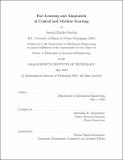Fast learning and adaptation in control and machine learning
Author(s)
Gaudio, Joseph Emilio.
Download1191716147-MIT.pdf (11.91Mb)
Other Contributors
Massachusetts Institute of Technology. Department of Mechanical Engineering.
Advisor
Anuradha M. Annaswamy.
Terms of use
Metadata
Show full item recordAbstract
As machine learning methods become more prevalent in society, problems of a dynamical nature will increasingly need to be considered, especially in the interactions of learning-based algorithms with the physical world. The dynamical nature of these problems may include regressors which are time-varying, necessitating new algorithms in machine learning approaches as well as real-time decision making in the presence of uncertainties using adaptive control approaches. Problems of stability, fast learning with analytical guarantees, and constrained nonlinear systems have to be simultaneously addressed. Some of these problems have to be addressed from a machine learning perspective, while others have to be dealt with using adaptive control approaches. Throughout, analytical guarantees must be considered in order to apply machine learning for decision making in real-time, especially for safety-critical systems. This thesis develops fast learning and adaptation algorithms for problems that lie at the intersection of adaptive control and machine learning. From the point of view of adaptive control, this thesis derives algorithms which ensure fast parameter convergence, with minimal overhead in computational complexity. In particular, algorithms with time-varying learning rates are employed to show fast parameter convergence with reduced requirements of persistent excitation, and analysis for time-varying parameters. From the point of view of machine learning, this thesis derives algorithms that are applicable for real-time decision making. In particular, these algorithms ensure fast prediction convergence, which is a necessary feature for satisfactory behavior in real-time systems. Algorithms which take into account natural system constraints, such as input magnitude and rate saturation are also derived order to provide for stability and learning in physically constrained dynamical systems. Throughout the thesis, analytical guarantees for all algorithms are provided.
Description
Thesis: Ph. D., Massachusetts Institute of Technology, Department of Mechanical Engineering, May, 2020 Cataloged from the official PDF of thesis. Includes bibliographical references (pages 249-264).
Date issued
2020Department
Massachusetts Institute of Technology. Department of Mechanical EngineeringPublisher
Massachusetts Institute of Technology
Keywords
Mechanical Engineering.